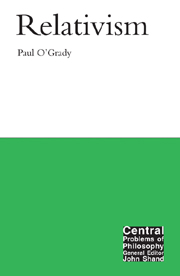4 - Epistemological relativism
Summary
There are a multiplicity of different positions to which the term epistemological relativism has been applied. However, the basic idea common to all forms denies that there is a single, universal means of assessing knowledge claims that is applicable in all contexts. Many traditional epistemologists have striven to uncover the basic process, method or set of rules that allows us to hold true beliefs. Think, for example, of Descartes's attempt to find the rules for the direction of the mind, Hume's investigation into the science of mind or Kant's description of his epistemological Copernican revolution. Each philosopher attempted to articulate universal conditions for the acquisition of true beliefs. Epistemological relativism can be best expressed negatively, just as ontological relativism was expressed in Chapter 3. It rejects an absolutist conception of epistemological justification: that always and everywhere there is a sole fundamental way by which beliefs are justified.
The multiplicity of positions labelled epistemological relativism arises due to the fact that the rejection of this absolutist view yields a variety of possible positions of varying degrees of strength. Philosophers have differed greatly in the amount of relativity they allow into the epistemological process. At a level that hardly anyone rejects, there is a degree of relativity in perceptual knowledge, depending on the perceptual apparatus and location of the individual. Yet perceptual relativism is often regarded as a primitive feature of cognition, below the level at which questions about the justification of belief arises and which is compatible with an absolutist conception of justification.
- Type
- Chapter
- Information
- Relativism , pp. 89 - 130Publisher: Acumen PublishingPrint publication year: 2002

